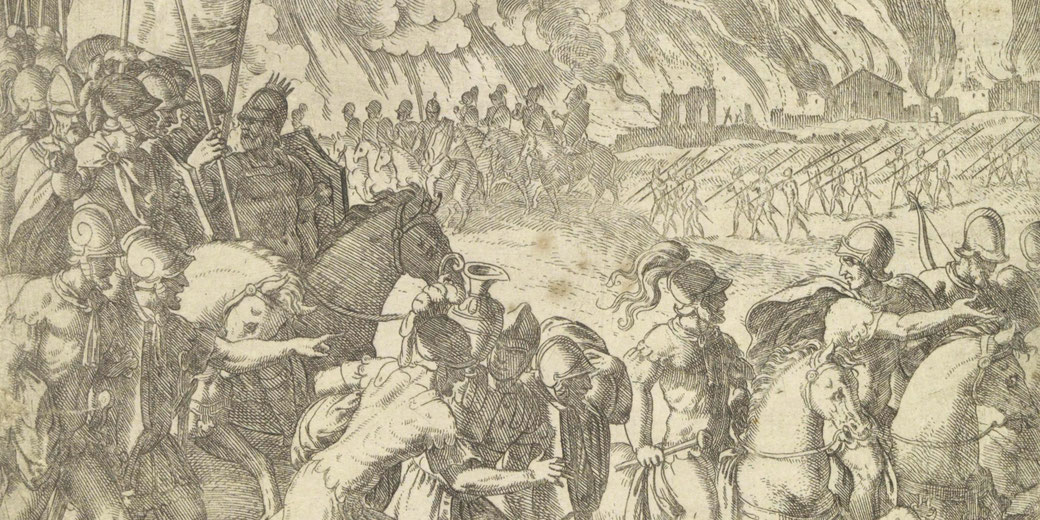Why ancient Rome’s war with Veii was its first great military conquest

The war between Rome and Veii was the first time the growing Latin state had tried to expand its territory and it saw Veii as a prime target for success.
For decades, the two cities had clashed in a series of brutal battles. However, with every passing year, the struggle intensified, and would be as epic to the Romans as the Trojan War was to the Greeks.
The growing power of a young Rome
By the 5th century BCE, Rome had begun expanding its influence in central Italy, encountering rival city-states such as Veii.
Veii was a prominent Etruscan city which controlled significant territories north of the Tiber River.
As a result of the fact that it was a wealthy settlement, it presented a lucrative target due to its fertile lands and abundant resources.
Both Rome and Veii vied for control over the fertile plains and trade routes along the Tiber River.
These disputes often led to skirmishes and heightened tensions between the two cities.
Acquiring new lands became a priority for securing food supplies and enhancing its strategic position, which would inevitably bring Rome into direct conflict with Veii.
Controlling Veii would provide Rome with a significant military advantage in the region.
By eliminating a powerful rival, Rome could secure its northern borders and strengthen its dominance in Latium.
The strategic location of Veii, with its fortified city and defensive capabilities, made it both a threat and an attractive target for conquest.
How the war with Veii unfolded
The initial confrontations between Rome and Veii in their war occurred in 405 BCE, when Rome launched a series of attacks to weaken Veii's defenses.
Then, in 403 BCE, the Romans laid siege to Veii itself. This would be the beginning of a ten-year effort to capture the city.
This siege was a grueling endeavor that tested the endurance and ingenuity of both sides. Veii, with its formidable defenses and strategic location, proved a difficult target for the Romans.
During this period, Rome constructed extensive fortifications around Veii to prevent any relief efforts. In response, Veii mounted several counterattacks, attempting to break the siege and reclaim their territory.
During the war, Rome made a significant change in its military system by paying its soldiers for the first time.
This decision arose from the necessity to maintain a prolonged siege, which required a standing army capable of continuous operations.
Prior to this, Roman soldiers, primarily landowners and farmers, served in the army without direct monetary compensation, returning to their fields after short campaigns.
So, in 406 BCE, the Roman Senate authorized the payment of stipends to the soldiers engaged in the siege of Veii. This policy aimed to sustain the army's efforts and ensure the soldiers' loyalty and morale.
As a result of this financial support, soldiers could focus on the war without worrying about their farms and families.
Regardless, for several years, the conflict reached a stalemate, with neither side able to secure a decisive victory.
However, in 396 BCE, Rome adopted a new strategy under the leadership of Marcus Furius Camillus. He decided to employ innovative tactics to breach Veii's formidable defenses.
Through the construction of underground tunnels, the Romans aimed to infiltrate the city. If successful, Camillus hoped to surprise and overwhelm the Veientines.

The dramatic fall of Veii
Eventually, the decisive moment came when Roman forces successfully tunneled beneath Veii's walls and launched a surprise attack.
While the Roman soldiers were digging the tunnels under the walls of Veii, they overheard the prophecy being given to the King of Veii in the temple above them.
The soothsayer said that anyone who completed certain rites would be victorious in the war.
They reported it to Marcus Furius Camillus, who devised a plan to exploit the prophecy for Rome's benefit.
He instructed his soldiers to immediately launch an attack from the tunnels into the temple and complete the rite. The sudden incursion caught the Veientines off guard, leading to their ultimate defeat.
The city's fall was brutal; Roman soldiers looted and destroyed much of Veii, and its population faced grim fates. Some were killed in the chaos, while others were sold into slavery.
At the end, Rome secured a vast amount of wealth and resources. Veii's fertile lands, valuable resources, and captured treasures greatly boosted Rome's economy.
With this influx of wealth, Rome could fund further military campaigns and infrastructure projects.
In addition to the material gains, the victory had profound political implications for Rome. Camillus emerged as a heroic figure, his leadership and strategy celebrated throughout the city.
As a result, Rome's influence and prestige in the region grew. Other neighboring city-states and tribes, witnessing Rome's might, were either subdued or formed alliances with Rome to avoid similar fates.
Therefore, Rome's sphere of influence expanded and paved the way for future territorial acquisitions.
What do you need help with?
Download ready-to-use digital learning resources
Copyright © History Skills 2014-2025.
Contact via email
With the exception of links to external sites, some historical sources and extracts from specific publications, all content on this website is copyrighted by History Skills. This content may not be copied, republished or redistributed without written permission from the website creator. Please use the Contact page to obtain relevant permission.





